 Document 1
Social Media Policy
Purpose
Document 1
Social Media Policy
Purpose
This policy describes the standards expected of employees of the National Disability Insurance Agency
(NDIA) in their use of social media.
The Social Media Policy applies to all NDIA employees, including employees on secondment (both to
and from the NDIA), employees on leave, casual and temporary employees and contractors. Managers
should ensure their employees are aware of and understand this policy.
People with disability are at the heart of the NDIA. People with disability are also incredibly digitally
connected and digitally savvy. If the NDIA is to communicate effectively and remain relevant with the
more than 460,000 participants at full scheme roll out then social media platforms will remain key.
Definitions
Social media includes social networking sites, blogs and other online media that allow user participation
and interaction.
Use of social media by Australian Public Service (APS) employees can be split into two categories:
official use and unofficial use.
Official use means use by persons authorised as agency spokespersons and representatives for official
purposes who are permitted to post content within the approved scope on external social media
channels.
Unofficial use of social media falls into two categories:
professional or
private.
A: Professional use is when an employee is a subject matter expert in a field that may relate to their
APS employment—or that may be wholly separate from it—and uses social media to comment in
that capacity. For example, an APS employee who is active in the disability sector might use social
media to discuss issues on a disability forum in their own time.
B:
Private use means use of social media in any other capacity.
All social media use
NDIA employees should understand that th
e APS Values an
d APS Code of Conduct standards apply to
all social media use.
The APS Code of Conduct requires APS employees to behave at all times ‘in a way that upholds the
APS Values and APS Employment Principles, and the integrity and good reputation of the employee’s
Agency and the APS’ - section 13(11) of the
Public Service Act 1999.
The APS Values and Code of Conduct apply to using social media both officially and unofficially. The
requirements include:
behaving with respect and courtesy, and without harassment
dealing appropriately with information, recognising that some information needs to remain
confidential
being sensitive to the diversity of the Australian public
taking reasonable steps to avoid conflicts of interest
making proper use of Commonwealth resources
upholding the APS Values and the integrity and good reputation of the APS and one’s agency
not acting in a way that would call into question the APS employee’s ability to be apolitical, impartial
and professional in the performance of their duties.
1 of 10

The APS Code of Conduct and APS Values apply even if material is posted anonymously or using a
pseudonym and employees should be mindful that at some point their identity and employment may be
revealed.
Possible sanctions, including termination, may apply if employees are found to have breached the APS
Code of Conduct through their use of social media.
APSC circular 2012/1 – guidance on making public comment and participating online – discusses the
APS Code of Conduct and its relationship to social media in more detail.
Official social media use
Acceptable official use by APS employees includes representing the agency online, monitoring issues
relevant to agency business or engaging in authorised professional development forums or activities.
Employees using social media in an official capacity require written approval from the relevant SES
(Branch Manager – Communications and Engagement). Communication and content standards that
apply to official use of social media will be established as part of that agreement.
Unofficial social media use
Acceptable unofficial use of social media while at work will include reasonable private use, consistent
with this policy and other relevant policies including the department’s IT Security Policy.
When using social media in an unofficial capacity, whether at work or not, employees should ensure that
a comment they make is not (or could not be perceived to be):
made on behalf of the NDIA
a criticism of the Government, a member of parliament from another political party, or their
respective policies, in that it raises questions about the APS employee’s capacity to work
professional y, efficiently or impartially. Such comment does not have to relate to the employee’s
area of work
a criticism of an agency’s administration that could seriously disrupt the workplace
a gratuitous personal attack that might reasonably be perceived to be connected with their
employment
compromising the employee’s ability to fulfill their duties in an apolitical, impartial and professional
manner
compromising public confidence in the agency or the APS.
Unless specifically authorised, agency employees should not develop or provide content for social media
channels that:
attempts to speak, or could be interpreted as speaking, on behalf of the agency or the Australian
Government
commits the agency or the Australian Government to any action or initiative.
Employees in doubt about acceptable use of social media as an APS employee should speak to their
manager in the first instance.
Accessibility
The NDIA is committed to social inclusion, and provides support for people with disabilities. In late 2011,
Media Access Australia undertook research to determine how the accessibility issues found in each of
the most popular social media tools can be overcome.
Australia’s most popular social media tools were tested for accessibility. Users with disabilities
contributed tips and tricks on how to overcome each social network’s inaccessible features.
2 of 10

Download the full report:
Sociability: social media for people with a disability
Where possible, content on official NDIA social media accounts should also be made available in an
alternativ
e accessible format. This alternative may be represented on NDIA internet sites, however given
the online interaction inherent in social media, it may also be appropriate to refer individuals to telephone
or face-to-face channels.
The Internet is forever
What you publish on the internet can remain public for a long time. Content can also be replicated and
shared beyond the original intended audience and sent to recipients who were never expected to see it,
or who may view it out of context. You should be aware that according to the terms and conditions of
some third-party sites, the content you create is the property of the site where it is posted and so may be
re-used in ways which you had not intended.
References
The
APS Code of Conduct is set out in section 13 of the
Public Service Act 1999.
The
APS Values are set out in section 10 of the
Public Service Act 1999.
APSC Circular 2012/1: Revisions to the Commission's guidance on making public comment and participating
online is available on the APSC website.
Policy authority
This policy is approved by Louise Glanville, NDIA Dep CEO on 20/1/2015
January 2015
3 of 10





Use of social media
Page 1 of 1
Document 2
National Disability Insurance Agency
Calendar People CHEEVER, Ben
Search for content, documents and people
Home
Service Delivery
Scheme Transition
Our Organisation
Corporate Services
Human
Home > Human Resources > Employment conditions > Use of social media
Use of social media
Related Links
• APS Values and Cod
• ICT Security Policy (
Social media are emerging media which allow people to discuss and share information online. Tools which aid this interaction
can include:
• Blogs – opinion articles and information that are regularly updated and commented on by others
• Wikis – web pages allowing users to collaborate and extend information by adding, removing and editing content
collectively
• Podcasting – created by posting an audio file to a website which can then be downloaded via subscription
• RSS (Really Simple Syndication) – allows users to receive updated information from websites, blogs or podcasts without
having to regularly visit the original site
• Tagging – keyword classification of content carried out by users which yields more relevant and useful search results
• Social networking sites such as Facebook, LinkedIn, Twitter, YouTube - provide a combination of tools designed to help
people connect and share information with each other.
The NDIA recognises that you may use these and other social media in your personal time (outside of working hours) and does
not intend to discourage nor unduly limit your personal communications or online activities. However, you should recognise the
potential for damage to be caused (either directly or indirectly) to the Agency and, possibly other client groups, in certain
circumstances through personal use of social media, particularly, if you can be identified as an Agency employee.
Employees are responsible for the content published from their social media platform and should be aware of the risks to ensure
that any risk of damage or detriment is minimised.
You should not:
• Use Agency ICT resources for inappropriate purposes such as to harass, defame, abuse, disclose personal information,
access or transmit pornographic material, nor for excessive personal use
• Imply that you are authorised to speak on behalf of the Agency or the government, or give the impression that any views
you express are those of the Agency or the government
• Use or disclose any confidential information or personal information obtained in your capacity as an employee of the
Agency
• Staff must not use ICT systems for unauthorised purposes including private commercial activities, illegally accessing a
computing service, downloading or distributiny inappropriate, undesirable or offensive material. Such activities may result
in disciplinary action including court prosecution.
The NDIA does accept some limited use for private purposes (e.g. email and internet), however, such use must be consistent
with APS values and this ICT Security Policy (in particular, the ICT Acceptance Use and Security Breaches section of that
document).
Social Media Policy.docx
Maintained by: Human Resources
Created: 29/06/2015 12:38 PM
Modified: 20/04/2016 10:19 AM
Links: Accessibility help | Acknowledgement of country
NDIS Social Media:
Twitter
4 of 10
https://intranet.ndiastaff.ndia.gov.au/hr/employment-conditions/Pages/Use-of-social-...
20/04/2016
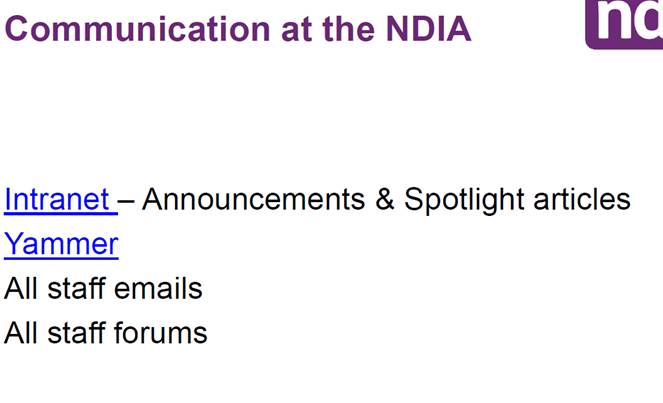
This is from
Working at the NDIA presentation – it is delivered Day 1 of Induction as part of the NDIA
Orientation.
Slide 25
5 of 10
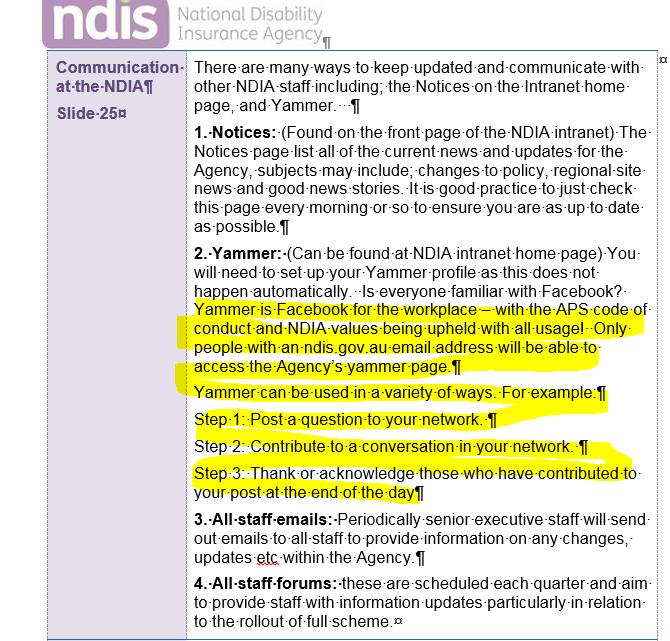
Slide 25 – excerpt from Facilitator Guide
6 of 10
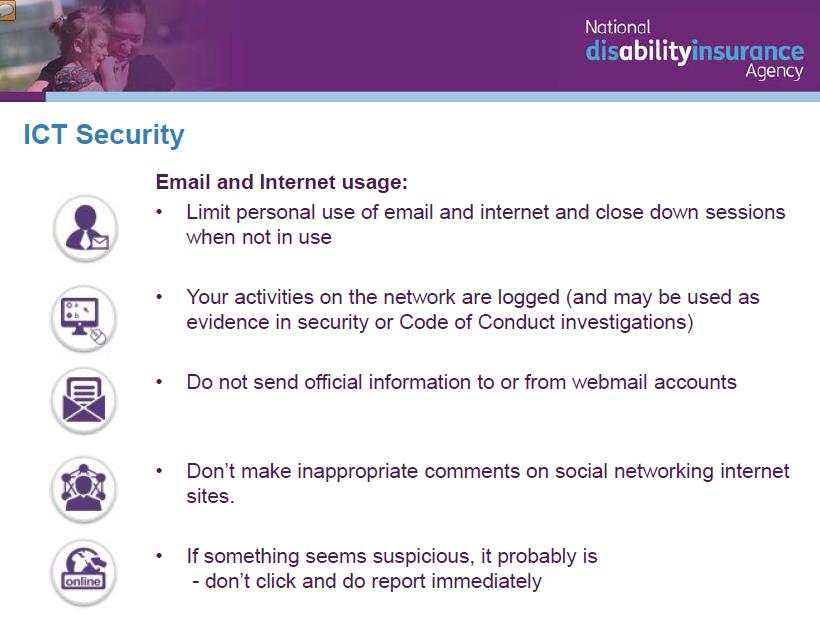 Human Resources (HR) Corporate Requirements – INDUCTION day one (MANDATORY)
7 of 10
Human Resources (HR) Corporate Requirements – INDUCTION day one (MANDATORY)
7 of 10
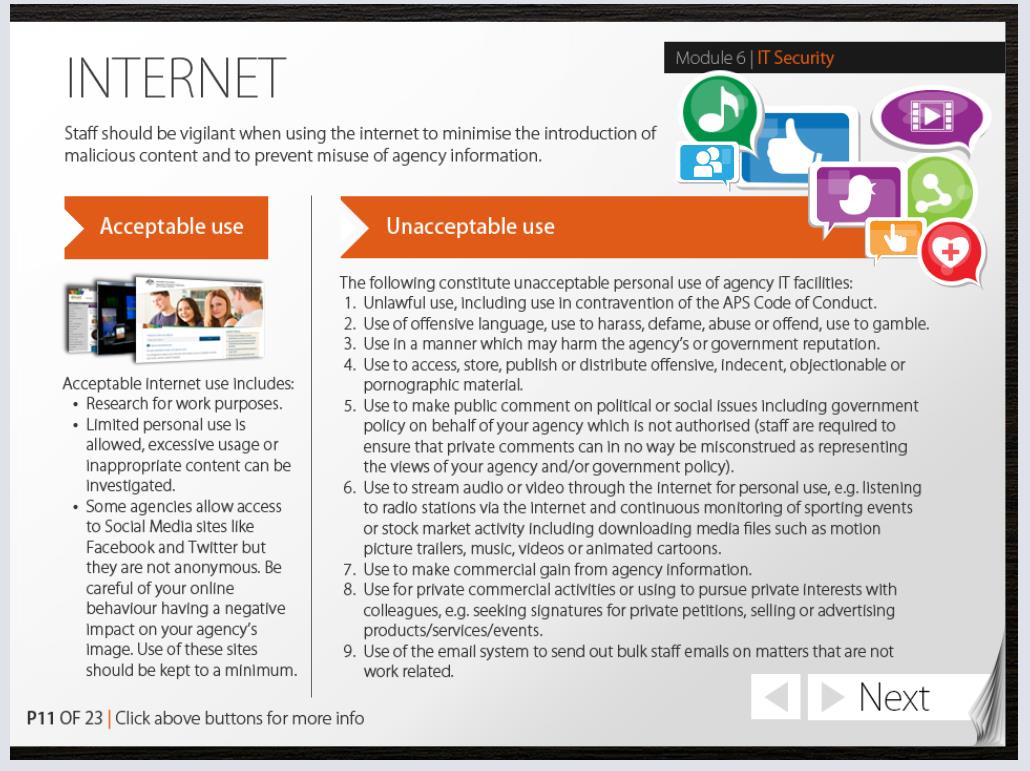
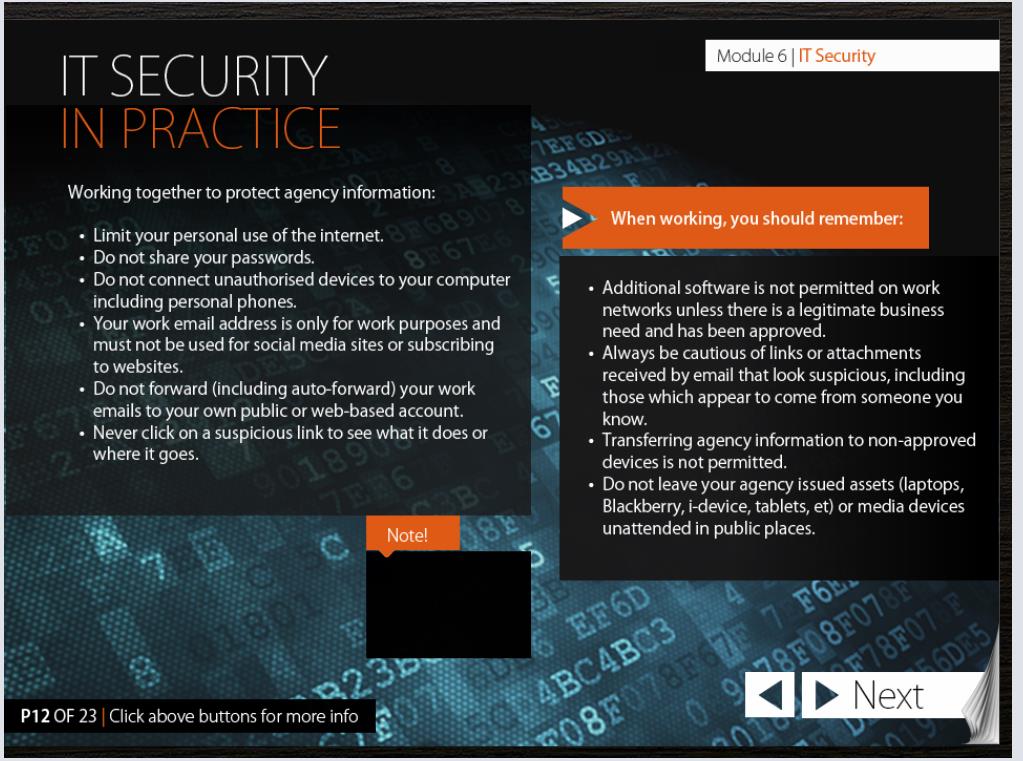 Security Awarebess ELearning - MANDATORY
8 of 10
Security Awarebess ELearning - MANDATORY
8 of 10
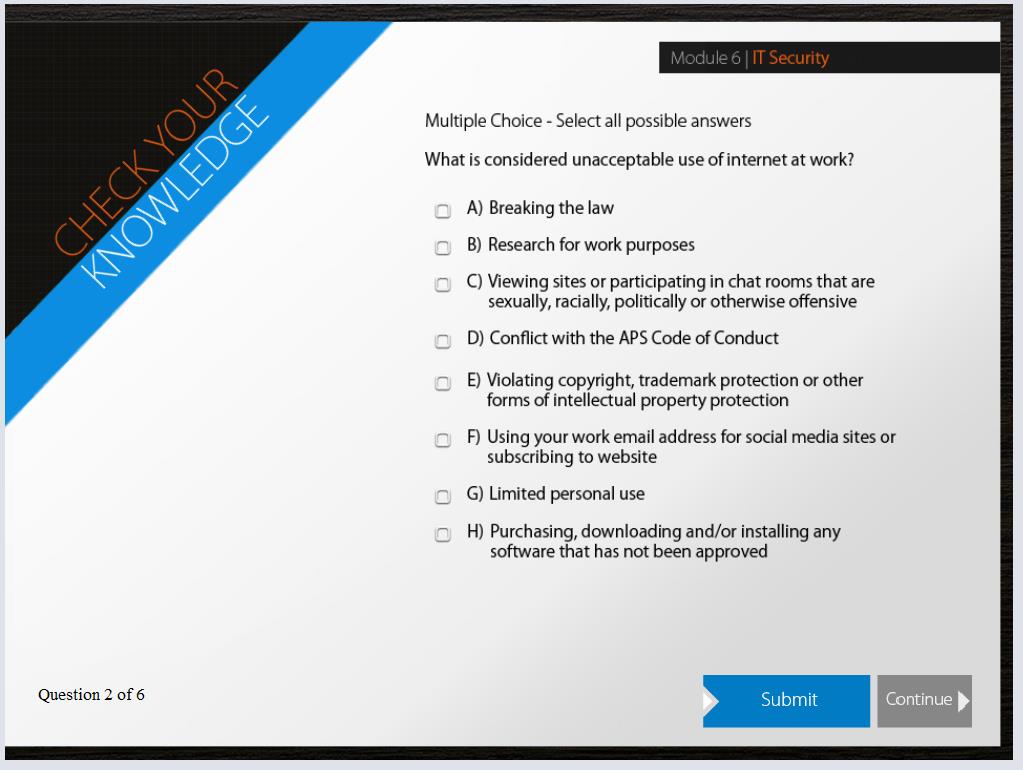 9 of 10
9 of 10
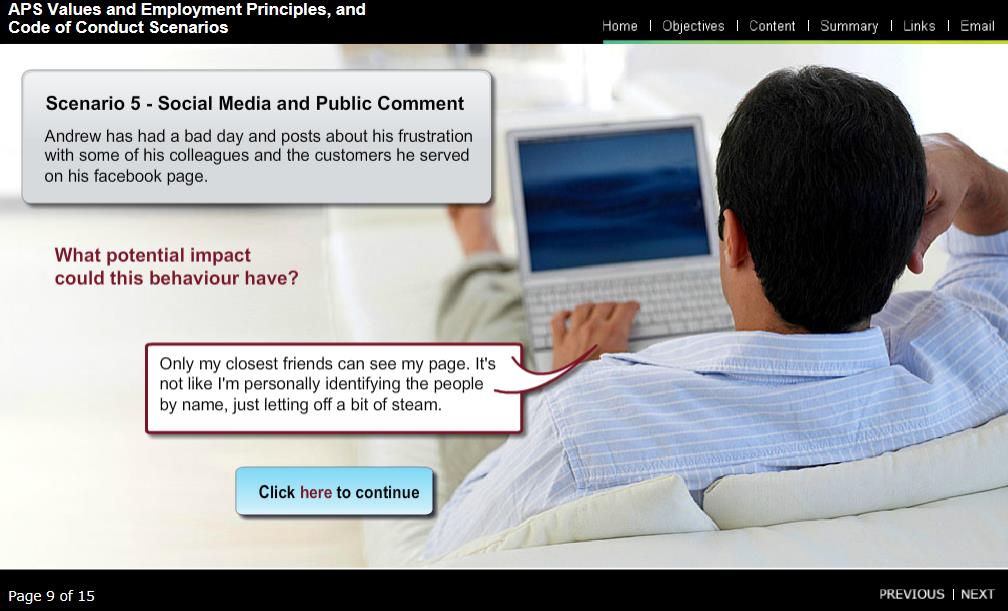
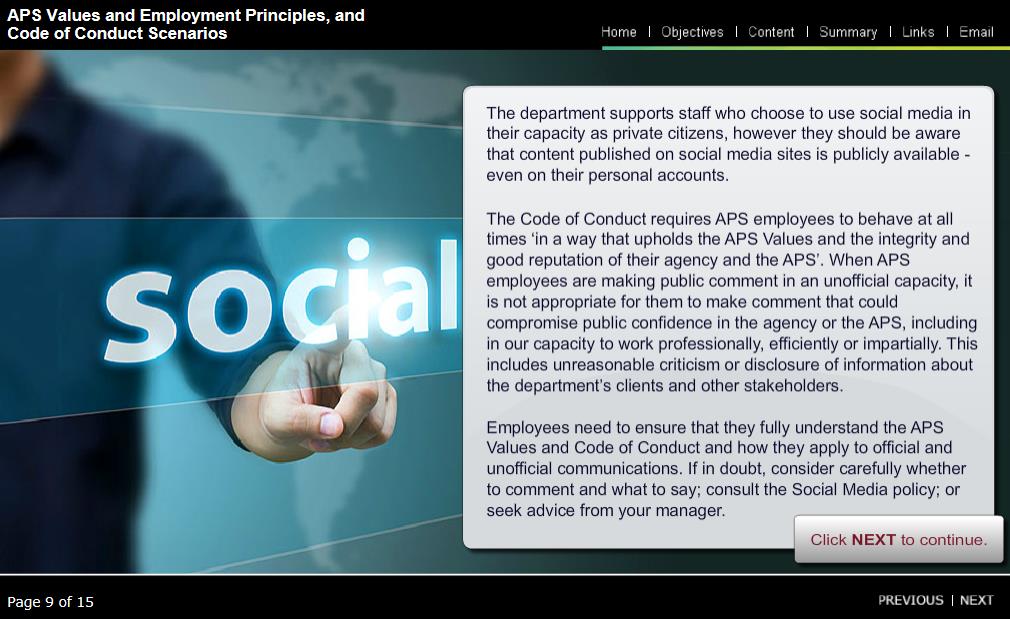 APS Values and Employment Principles, and Code of Conduct eLearning - MANDATORY
10 of 10
APS Values and Employment Principles, and Code of Conduct eLearning - MANDATORY
10 of 10
Document Outline















